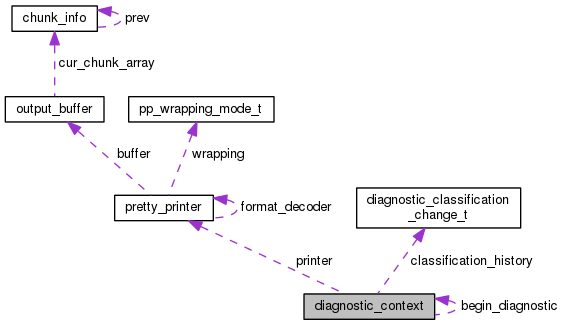#include <diagnostic.h>

Data Fields | |
| pretty_printer * | printer |
| int | diagnostic_count [DK_LAST_DIAGNOSTIC_KIND] |
| bool | some_warnings_are_errors |
| bool | warning_as_error_requested |
| int | n_opts |
| diagnostic_t * | classify_diagnostic |
| diagnostic_classification_change_t * | classification_history |
| int | n_classification_history |
| int * | push_list |
| int | n_push |
| bool | show_caret |
| int | caret_max_width |
| bool | show_option_requested |
| bool | abort_on_error |
| bool | show_column |
| bool | pedantic_errors |
| bool | permissive |
| int | opt_permissive |
| bool | fatal_errors |
| bool | dc_inhibit_warnings |
| bool | dc_warn_system_headers |
| unsigned int | max_errors |
| diagnostic_starter_fn | begin_diagnostic |
| diagnostic_finalizer_fn | end_diagnostic |
| void(* | internal_error )(diagnostic_context *, const char *, va_list *) |
| int(* | option_enabled )(int, void *) |
| void * | option_state |
| char *(* | option_name )(diagnostic_context *, int, diagnostic_t, diagnostic_t) |
| void * | x_data |
| location_t | last_location |
| struct line_map * | last_module |
| int | lock |
| bool | inhibit_notes_p |
Detailed Description
This data structure bundles altogether any information relevant to the context of a diagnostic message.
Field Documentation
| bool diagnostic_context::abort_on_error |
True if we should raise a SIGABRT on errors.
Referenced by diagnostic_action_after_output().
| diagnostic_starter_fn diagnostic_context::begin_diagnostic |
@verbatim
This function is called before any message is printed out. It is responsible for preparing message prefix and such. For example, it might say: In file included from "/usr/local/include/curses.h:5: from "/home/gdr/src/nifty_printer.h:56: ...
| int diagnostic_context::caret_max_width |
Maximum width of the source line printed.
| diagnostic_classification_change_t* diagnostic_context::classification_history |
History of all changes to the classifications above. This list
is stored in location-order, so we can search it, either
binary-wise or end-to-front, to find the most recent
classification for a given diagnostic, given the location of the
diagnostic.
Referenced by default_diagnostic_finalizer(), and default_diagnostic_starter().
| diagnostic_t* diagnostic_context::classify_diagnostic |
For each option index that can be passed to warning() et al
(OPT_* from options.h when using this code with the core GCC
options), this array may contain a new kind that the diagnostic
should be changed to before reporting, or DK_UNSPECIFIED to leave
it as the reported kind, or DK_IGNORED to not report it at
all.
| bool diagnostic_context::dc_inhibit_warnings |
True if all warnings should be disabled.
| bool diagnostic_context::dc_warn_system_headers |
True if warnings should be given in system headers.
| int diagnostic_context::diagnostic_count[DK_LAST_DIAGNOSTIC_KIND] |
The number of times we have issued diagnostics.
| diagnostic_finalizer_fn diagnostic_context::end_diagnostic |
This function is called after the diagnostic message is printed.
| bool diagnostic_context::fatal_errors |
True if errors are fatal.
| bool diagnostic_context::inhibit_notes_p |
Referenced by trim_filename().
| void(* diagnostic_context::internal_error)(diagnostic_context *, const char *, va_list *) |
Client hook to report an internal error.
| location_t diagnostic_context::last_location |
Used to detect that the last caret was printed at the same location.
Referenced by adjust_line().
| struct line_map* diagnostic_context::last_module |
Used to detect when the input file stack has changed since last
described.
| int diagnostic_context::lock |
| unsigned int diagnostic_context::max_errors |
Maximum number of errors to report.
| int diagnostic_context::n_classification_history |
The size of the above array.
Referenced by default_diagnostic_starter().
| int diagnostic_context::n_opts |
The number of option indexes that can be passed to warning() et
al.
| int diagnostic_context::n_push |
| int diagnostic_context::opt_permissive |
The index of the option to associate with turning permerrors into
warnings.
| int(* diagnostic_context::option_enabled)(int, void *) |
Client hook to say whether the option controlling a diagnostic is
enabled. Returns nonzero if enabled, zero if disabled.
| char*(* diagnostic_context::option_name)(diagnostic_context *, int, diagnostic_t, diagnostic_t) |
Client hook to return the name of an option that controls a
diagnostic. Returns malloced memory. The first diagnostic_t
argument is the kind of diagnostic before any reclassification
(of warnings as errors, etc.); the second is the kind after any
reclassification. May return NULL if no name is to be printed.
May be passed 0 as well as the index of a particular option.
| void* diagnostic_context::option_state |
Client information to pass as second argument to
option_enabled.
| bool diagnostic_context::pedantic_errors |
True if pedwarns are errors.
| bool diagnostic_context::permissive |
True if permerrors are warnings.
| pretty_printer* diagnostic_context::printer |
Where most of the diagnostic formatting work is done.
Referenced by default_tree_diagnostic_starter(), diagnostic_report_current_module(), lhd_initialize_diagnostics(), lhd_print_error_function(), and trim_filename().
| int* diagnostic_context::push_list |
For pragma push/pop.
| bool diagnostic_context::show_caret |
True if we should print the source line with a caret indicating
the location.
Referenced by adjust_line().
| bool diagnostic_context::show_column |
True if we should show the column number on diagnostics.
Referenced by lhd_print_error_function().
| bool diagnostic_context::show_option_requested |
True if we should print the command line option which controls
each diagnostic, if known.
| bool diagnostic_context::some_warnings_are_errors |
True if we should display the "warnings are being tread as error"
message, usually displayed once per compiler run.
| bool diagnostic_context::warning_as_error_requested |
True if it has been requested that warnings be treated as errors.
Referenced by setup_core_dumping().
| void* diagnostic_context::x_data |
Auxiliary data for client.
The documentation for this struct was generated from the following file:
